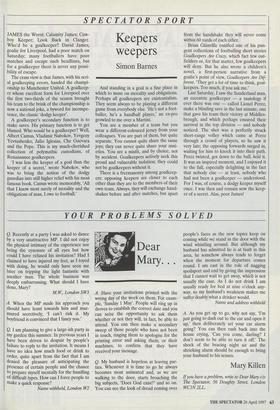SPECTATOR SPORT
Keepers weepers
Simon Barnes
JAMES the Worst; Calamity James; Cow- boy Keeper; Look Back in Clanger. Who'd be a goalkeeper? David James, goalie for Liverpool, had a poor match on Saturday; many footballers have poor matches and escape such headlines, but for a goalkeeper there is never any possi- bility of escape.
The crass view is that James, with his seri- al goalkeeping errors, handed the champi- onship to Manchester United. A goalkeep- er whose excellent form for Liverpool over the first two-thirds of the season brought his team to the brink of the championship is now a national joke, a byword for incompe- tence, the classic 'dodgy keeper'.
A goalkeeper's secondary function is to make saves. His primary function is to get blamed. Who would be a goalkeeper? Well, Albert Camus, Vladimir Nabokov, Yevgeny Yevtushenko, Julio Iglesias, Che Guevara and the Pope. This is my much-cherished collection of polymathic custodians, of Renaissance goalkeepers.
`I was less the keeper of a goal than the keeper of a secret,' wrote Nabokov, who was to bring the notion of the dodgy guardian into still higher relief with his most famous book. Camus wrote memorably, 'All that I know most surely of morality and the obligations of man, I owe to football.' And standing in a goal is a fine place in which to muse on morality and obligations. Perhaps all goalkeepers are existentialists. They seem always to be playing a different game from everybody else. 'He's not a foot- baller, he's a handball player,' an ex-pro growled to me over a Martini.
You are a member of a team but you wear a different-coloured jersey from your colleagues. You are part of them, but quite separate. You cannot quite share the same joys; they can never quite share your anxi- eties. You are a misfit, and by choice, not by accident. Goalkeepers actively seek this proud and vulnerable isolation; they could not be goalkeepers without it. There is a freemasonry among goalkeep- ers: opposing keepers are closer to each other than they are to the members of their own team. Always, they will exchange hand- shakes before and after matches, but apart from the handshake they will never come within 60 yards of each other.
Brian Glanville entitled one of his pun- gent collections of footballing short stories Goalkeepers Are Crazy, which fact few out- fielders or, for that matter, few goalkeepers will deny. But he also wrote a children's novel, a first-person narrative from a goalie's point of view, Goalkeepers Are Dif- ferent. 'They get a lot of time to think, goal- keepers. Too much, if you ask me.'
Last Saturday, I saw the Sunderland man, an eccentric goalkeeper — a tautology if ever there was one — called Lionel Perez, make a blinding save in the last minute, one that gave his team their victory at Middles- brough, and which perhaps ensured their survival in the top division — and nobody noticed. The shot was a perfectly struck short-range volley which came at Perez through a crowd of players, so he saw it very late; the opposing forwards surged in, waiting for him to knock it into their path. Perez twisted, got down to the ball, held it. It was an inspired moment, and I enjoyed it to the full, especially delighting in the fact that nobody else — at least, nobody who had not been a goalkeeper — understood. For I was, of course, a dodgy keeper myself once. I was then and remain now the keep- er of a secret. Alas, poor James!


































































 Previous page
Previous page